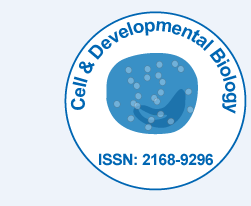
Cell & Developmental Biology
Open Access
ISSN: 2168-9296

ISSN: 2168-9296
Perspective - (2023)Volume 12, Issue 2
Embryonic stem cells are undifferentiated cells that have the potential to develop into any type of cell in the human body. This incredible ability has sparked hope for a multitude of medical treatments and cures, from regenerating damaged organs to treating genetic disorders. However, the use of embryonic stem cells has also been the subject of intense controversy, with ethical concerns about the use of human embryos in research and the potential for exploitation. we will explore the promise and controversy of embryonic stem cells. The promise of embryonic stem cells lies in their potential to treat a variety of diseases and conditions. The repair of damaged tissue in the brain or heart, the treatment of diabetes, and the development of new drugs. Embryonic stem cells have already been used in clinical trials to treat conditions such as spinal cord injury and macular degeneration, with promising results. Despite the potential benefits of embryonic stem cells, their use has been controversial. The primary source of embryonic stem cells is human embryos, which are usually obtained from in vitro fertilization clinics. This raises ethical concerns about the use of human embryos in research, with some arguing that it is immoral to destroy potential life. Additionally, there are concerns about the potential for exploitation, with some worrying that the use of embryonic stem cells could lead to the creation of "designer babies" or the commercialization of human life. In response to these concerns, several regulations and guidelines have been put in place to ensure that the use of embryonic stem cells is ethical and responsible. In the United States, federal funding for embryonic stem cell research was restricted until 2009, when President Barack Obama signed an executive order lifting the ban. However, the use of federal funds for embryonic stem cell research is still subject to strict guidelines, including requirements for informed consent from donors and restrictions on the creation of embryos solely for research purposes. Despite these regulations, the controversy surrounding embryonic stem cells persists. Some argue that adult stem cells, which are found in various tissues in the body, are a viable alternative to embryonic stem cells. While adult stem cells do not have the same ability to differentiate into any type of cell as embryonic stem cells, they can still be used to treat a range of conditions, including blood disorders, autoimmune diseases, and heart disease. Additionally, the use of adult stem cells avoids the ethical concerns surrounding the use of human embryos.
Ultimately, the decision to use embryonic stem cells in research and treatment is a complex one that must balance the potential benefits with ethical concerns. While embryonic stem cells have shown great promise in treating a variety of diseases and conditions, their use must be carefully regulated to ensure that it is responsible and ethical. Additionally, research into alternative sources of stem cells, such as adult stem cells and induced pluripotent stem cells, should continue to expand our understanding of how stem cells can be used to treat disease.
The promise and controversy of embryonic stem cells reflect the complex intersection of science, ethics, and public policy. While the potential benefits of embryonic stem cells are vast, the ethical concerns surrounding their use must be taken seriously. As the field of stem cell research continues to evolve, it is important that we continue to engage in thoughtful and informed discussions about the implications of this research for our society and our future. By doing so, we can ensure that the promise of embryonic stem cells is realized in a responsible and ethical manner.
Citation: Vidwans T (2023) The Promise and Controversy Involved in Embryonic Stem Cells. Cell Dev Biol. 12:273.
Received: 01-Mar-2023, Manuscript No. CDB-23-22710 ; Editor assigned: 03-Mar-2023, Pre QC No. CDB-23-22710 (PQ); Reviewed: 17-Mar-2023, QC No. CDB-23-22710 ; Revised: 24-Mar-2023, Manuscript No. CDB-23-22710 (R); Published: 31-Mar-2023 , DOI: 10.35248/2168-9296.22.12.273
Copyright: © 2023 Vidwans T. This is an open-access article distributed under the terms of the Creative Commons Attribution License, which permits unrestricted use, distribution and reproduction in any medium, provided the original author and source are credited.